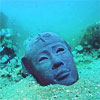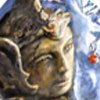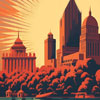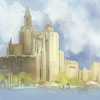The Civilization Of Atlantis
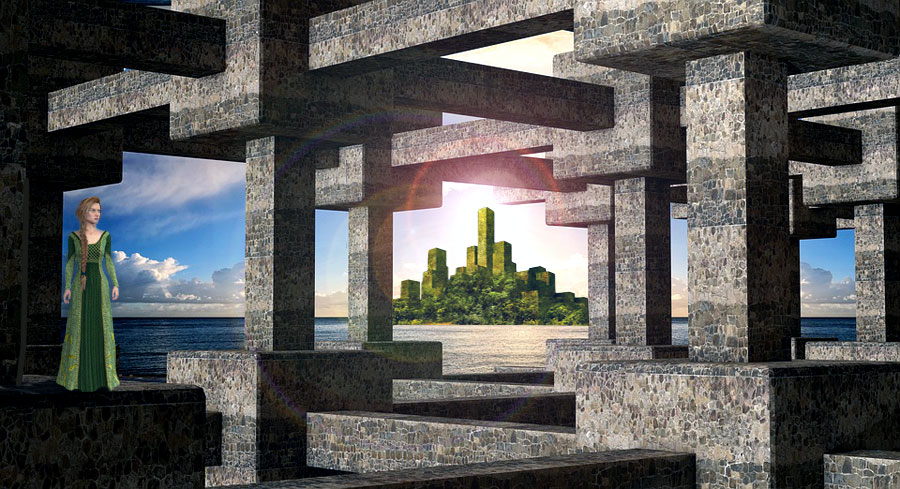 by Annie Besant and C.W. Leadbeater
by Annie Besant and C.W. Leadbeater
A good account of Atlantis may be read in The Story of Atlantis by W. Scott-Elliot. The writers of the present book were among the collaborators who collected the materials therein so ably arranged and presented; so the ground is very familiar to us.
Atlantis peopled many countries with its sub-races, and built many splendid civilizations. Egypt, Mesopotamia, India, North and South America, knew them, and the Empires they raised endured for long, and reached a point of glory that the Aryan Race has not yet over-topped.
Mr. Scott-Elliot thus describes the famous City of the Golden Gates: “A beautifully wooded park-like country surrounded the city. Scattered over a large area of this were the villa-residences of the wealthier classes. To the west lay a range of mountains, from which the water-supply of the city was drawn. The city itself was built on the slopes of a hill, which rose from the plain about five hundred feet. On the summit of this hill lay the Emperor’s palace and gardens, in the center of which welled up from the earth a never-ending stream of water, supplying first the palace and the fountains in the gardens, thence flowing in the four directions, and falling in cascades into a canal or moat which encompassed the palace grounds, and thus separated them from the city which lay below on every side. From this canal four channels led the water through four quarters of the city to cascades which, in their turn, supplied another encircling canal at a lower level. There were three such canals forming concentric circles, the outermost and lowest of which was still above the level of the plain. A fourth canal at this lowest level, but on a rectangular plan, received the constantly flowing waters, and in it turn discharged them into the sea. The city extended over part of the plain, up to the edge of this great outermost moat, which surrounded and defended it with a line of waterways extending about twelve miles by ten miles square.
“It will thus be seen that the city was divided into three great belts, each hemmed in by its canals. The characteristic feature of the upper belt, that lay just below the palace grounds, was a circular race-course and large public gardens. Most of the houses of the court officials also lay on this belt, and here also was an institution of which we have no parallel in modern times. The term ‘Strangers’ Home’ amongst us suggests a mean appearance and sordid surroundings; but this was a palace where all strangers who might come to the city were entertained as long as they might choose to stay–being treated all the time as guests of the Government. The detached houses of the inhabitants and the various temples scattered throughout the city occupied the other two belts. In the days of this Toltec greatness there seems to have been no real poverty–even the retinue of slaves attached to most houses being well fed and clothed–but there were a number of comparatively poor houses in the lowest belt to the north, as well as outside the outermost canal towards the sea. The inhabitants of this part were mostly connected with shipping, and their houses, though detached, were built closer together than in other districts.”
Other large towns, built on the plains, were protected by immense banks of earth, sloping towards the town, and sometimes terraced, while, on the outward side, they were faced with thick plates of metal, clamped together; these were supported on great beams of wood, the uprights being driven deeply into the earth; when these were in place, and connected with heavy crossbars, the plates were attached to them, overlapping like scales, and then the space between the earth-work and the barrier was filled with earth, solidly rammed together. The whole formed a practically impregnable barrier against the spears, swords, and bows and arrows which were the usual weapons of the time. But such a city necessarily lay open to assaults from above, and the Atlanteans carried the making of air-ships–aeroplanes, we call them now–to a high pitch of excellence; and, if such a city were to be attacked, these birds-of-war were sent to hover over it, and to drop into it bombs which burst in the air, and discharged a rain of heavy poisonous vapor, destructive of human life. Allusions to these may be found in the conflicts related in the great epics and Puranas of the Hindus. They had also weapons which projected sheaves of fire-tipped arrows, which scattered far and wide as they hurtled through the air like deadly rockets, and many others of similar kinds, all constructed by men well-versed in the higher branches of scientific knowledge. Many of these are described in the very ancient books above referred to, and they are mentioned as being given by some superior Being. The knowledge required for their construction was never made common.
The absence of poverty and the general well-being of the population were largely due to the provision therein made for universal primary education. The whole scheme of government was planned out by the Wise for the benefit of all, and not by special classes for their own advantage. Hence the general comfort was immensely higher than in modern civilizations.
Science was carried far; for, the use of clairvoyance being habitual, the processes of nature, now invisible to most, were readily observed. Its applications to arts and crafts were also numerous and useful. The rays of sunshine, sent through colored glass, were used for promoting the growth of plants and animals; scientific breeding was carefully carried out for the improvement of promising species; experiments were tried in crossing–e.g., the crossing of wheat with various grasses produced different kinds of grain; less satisfactory were the attempts which produced wasps from bees; and white ants from ants. (Wheat, bees and ants were brought from Venus by the Lords of the Flame, and the crossing of these with species already existing on the earth brought about the results named. The nature-spirits in charge of some departments of animal and vegetable evolution also attempted on their own account to imitate, with the purely terrestrial resources at their disposal, these importations from another planet. Their efforts, which were only partially successful, are responsible for some of the more unpleasant results above-mentioned.) The seedless banana was evolved from a melon-like ancestor, containing, like the melon, large quantities of seeds. Forces, the knowledge of which has been lost, were known to the science of the day; one of these was used for the propulsion of both air–and water-ships; another for so changing the relation of heavy bodies to the earth that the earth repelled instead of attracting them, so making the raising of gigantic stones to a lofty height a matter of the greatest ease. The subtler of these were not applied by machinery, but were controlled by will-power, using the thoroughly understood and developed mechanism of the human body, “the vina of a thousand strings”.
Metals were much used and admirably wrought, gold, silver and aurichalcum being those most employed in decoration and in domestic utensils. They were more often alchemically produced than sought for in the crust of the earth, and were often very artistically introduced to add richness to schemes of decoration, carried out in brilliant colors. Armour was gorgeously inlaid with them, and that used merely for show in pageants and ceremonies was often entirely made of the precious metals; golden helmets, breast-plates and greaves being worn on such occasions over tunics and stockings of the most brilliant colors–scarlet, orange, and a very exquisite purple.
Food differed in different classes. The masses of the people ate meat, fish, and even reptiles–perhaps one should not say ‘even,’ remembering the turtle of our City Fathers. The carcass of an animal was hung up over a large fire; when it was thoroughly cooked through it was removed from the fire, the contents were scooped out and, among the more refined, placed on dishes, while the rougher people gathered round the carcass itself; and plunged their hands into its interior–a plan which sometimes led to quarrels; the rest was thrown away or given to domestic animals, the flesh itself being considered as offal. The higher classes partook of similar food, but those belonging immediately to the Court made rather a secret of such banquets. The Divine King, of course, and those closely connected with Him, ate only food composed of grains cooked in various ways, vegetables, fruits, and milk, the latter being drunk as a liquid, or made into many sweet preparations. Fruit juices were also largely used as drinks. Some of the courtiers and dignitaries, while partaking of these milder comestibles publicly, were observed quietly stealing away to their private chambers and feasting on more desirable viands, among which fish, as ‘high’ as modern game, played a not inconspicuous part.
Government was autocratic, and in the palmy days of civilization under the Divine Toltec Kings, no system could have been happier for the people; but as the unchecked powers they wielded passed into the hands of younger souls, abuses crept in and troubles arose; for here, as everywhere, decay began in the corruption of the highest. The system was that Governors were held accountable for the welfare and happiness of their provinces, and crime or famine was regarded as due to their negligence or incapacity. They were drawn chiefly from the upper classes, but specially promising children were drafted out into the higher schools to be trained for the service of the State, whenever they were found. Sex was no disqualification, as it is now, for any office in the State. (The exclusion of women from political power in England only came, it should be remembered, with the growth of democracy, and the consequent idea that physical force, not intelligence or character, should be the basis of Government. This is the nadir of political life, as the occult system is its zenith.)
The immense growth of wealth and of luxury gradually undermined the most splendid civilization that the world has yet seen. Knowledge was prostituted to individual gain, and control over the powers of nature was turned from service to oppression. Hence Atlantis fell, despite the glory of its achievements and the might of its Empires; and the leading of the world passed into the hands of a daughter Race, the Aryan, which, though it has to its credit many magnificent achievements in the past, has not yet reached the zenith of its glory and its power, and will, some centuries hence, rise even higher than Atlantis rose in its palmiest days.
Excerpt from Man: Whence, How and Whither
Posted in Atlantis, Other Topics, True History of Manwith comments disabled.


